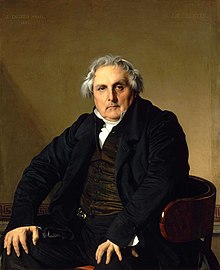Louis-François Bertin

Louis-François Bertin , called Bertin the Elder (French Bertin l'aîné ) (born December 14, 1766 in Paris , † September 13, 1841 in Paris) was a French journalist and political author.
Life
Louis-François Bertin was the son of a secretary to the Duke of Choiseul and had a younger brother, Louis-François Bertin de Vaux (* 1771, † 1842). He wanted to devote himself to the clergy, but as a result of the French Revolution chose a career as a journalist. Accordingly, he developed a great journalistic activity from 1793, first worked on the Journal Français , then on the Courrier Universel and after the fall of Robespierre published the Éclair , which was suppressed as royalist by the Directory in 1798 . Bertin had to hide in order to avoid exile. After the coup d'état of Napoleon , he and his brother acquired the Journal des débats et des décrets from the printer Baudouin in January 1800, which had existed since 1789 , which came out under him as the Journal des débats politiques et littéraires and soon became the most important organ of the monarchical party.
After Bertin had already been in a prison, the Temple , for nine months in 1800 , he was arrested again in February 1801 for alleged conspiracies with England and sent to Elba and was only allowed to stay on the island with difficulty in Italy swap. Returning to Paris in 1804, he took over the editing of his paper again, which, however , had to keep the title Journal de l'Empire on the orders of Napoleon, who had risen to emperor, and under the direction of Joseph Fiévée , who was forced upon the editorial staff and in whose place Étienne took his place in 1808, one received almost entirely government-loyal line. At that time he also edited the Mercure de France with François-René de Chateaubriand , whom Bertin had already met in Italy , but in 1811 completely lost his ownership of the Journal de l'Empire due to Napoleon's disfavour .
It was only after the return of the Bourbons that Bertin's newspaper appeared again in April 1814 under the old title Journal des débats politiques et littéraires and zealously defended the legitimate monarchy. During Napoleon's reign of the Hundred Days (March – June 1815) the paper was given away to a compliant journalist. Meanwhile, Bertin followed Louis XVIII. to Ghent and took part in the editing of the Moniteur de Gand . The second restoration called him back to his paper in Paris. Since the rise of Charles X (1824), on whose orders Chateaubriand had to resign from the administration of the journal, Bertin turned away from the cause of the Bourbons and advocated the constitutional principles of the doctrinaires. Later he worked in favor of the moderate administration of Martignac , but when he resigned he rejoined the opposition and polemicized against the last ministry of Charles X. In June 1830, the newspaper had to defend itself over an essay that ended with the words: "Malheureuse France, malheureux roi!"
After the victory of the July Revolution of 1830 , Bertin declared himself, although he had initially refused to join the opposition of the liberal journals against the July ordinances , for the "citizen king" Louis-Philippe I and was one of his most important pillars. However, he maintained a certain independence. He died on September 13, 1841 at the age of 74.
His two sons Louis-Marie-Armand Bertin (* 1801; † 1854) and Edouard Bertin (* 1797; † 1871) successively headed the Journal des débats after his death . His daughter Louise-Angélique Bertin (* 1805; † 1877) was a poet, painter and composer.
literature
- Louis-François Bertin . In: Meyers Konversations-Lexikon . 4th edition. Volume 2, Verlag des Bibliographisches Institut, Leipzig / Vienna 1885–1892, p. 796.
| personal data | |
|---|---|
| SURNAME | Bertin, Louis-François |
| ALTERNATIVE NAMES | Bertin the Elder; Aîné, Bertin l ' |
| BRIEF DESCRIPTION | French journalist and political writer |
| DATE OF BIRTH | December 14, 1766 |
| PLACE OF BIRTH | Paris |
| DATE OF DEATH | September 13, 1841 |
| Place of death | Paris |